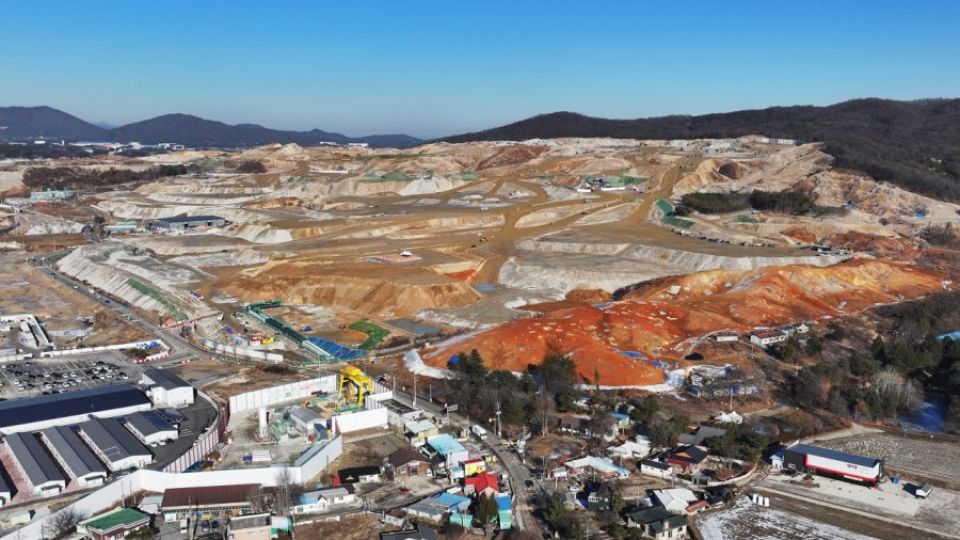January 19, 2024
SEOUL – President Yoon Suk Yeol said on Monday that the semiconductor chip cluster in southern Gyeonggi Province will draw combined investments of 622 trillion won ($471.4 billion) for facilities and create 3 million jobs.
With the investments, South Korea plans to double the number of chip-producing plants across southern Gyeonggi Province to 37.
The investments came along with South Korea‘s plan to consolidate chip plants — including 16 new ones to be built by 2047 — into a large chip cluster capable of memory chip manufacturing, foundry services and research, spanning major cities south of Seoul, including Hwaseong, Giheung, Pyeongtaek, Anseong, Yongin, Icheon, Suwon and Pangyo, according to Industry Ministry in a separate statement.
“We are anticipating a 622 trillion-won investment in the chip cluster and 3 million high-quality jobs in the next 20 years,” Yoon told some 110 participants at the public debate, including some 50 ordinary attendees, at Sungkyunkwan University’s natural sciences campus in Suwon, Gyeonggi Province. Monday’s session was his third of 10 such scheduled events.
“In the next five years, beginning this year, 158 trillion won will be spent and a total of 950,000 new jobs will be created.”
The bold plan encompasses investment commitments previously made by chip-to-mobile giant Samsung Electronics and its partners, including a 360 trillion-won plan to set up a foundry plant for chip designer clients in Yongin, and a 120 trillion-won plan to add production lines for memory chips and foundry services in Pyeongtaek. Samsung’s memory chip rival SK hynix also envisions a 122 trillion-won plan to set up a new memory chip plant in Yongin.
The Yoon administration estimates that the chip cluster will be built across 21 million square meters of land combined, with installed capacity of semiconductor manufacturing reaching 7.7 million 200-millimeter-equivalent wafers per month.
Yoon also encouraged the chip cluster to include nuclear power plants to ensure stable supply of electricity.
“We need a 1.3-gigawatt nuclear reactor to operate a foundry, because a single line consumes more electricity than cities like Daejeon or Gwangju. And it took more than 10 years to set up the electricity infrastructure to run Samsung’s Giheung Campus, which has seven production lines,” Yoon said.
“Nuclear power plants are crucial for the stable supply of high-quality electricity. A nuclear phase-out, on the other hand, will come at the cost of cutting-edge technology development.”
Yoon also hinted at extending the expiration of tax incentives to companies spending money on chipmaking infrastructure. Since January last year, South Korea has provided a corporate tax break for facility investment in semiconductors and other strategic industries to 15 percent for large corporations such as Samsung Electronics and SK hynix, from the previous 8 percent, and to 25 percent for small and midsized enterprises, from 16 percent. The incentives were set to expire by the end of this year.
South Korea is home to two memory chip powerhouses — Samsung Electronics and SK hynix — that sell over 60 percent of the world’s memory chips. Samsung Electronics also runs the world’s second-largest foundry business, allowing chip designers to outsource chip manufacturing, trailing only Taiwan’s TSMC.
Semiconductor chips have been a key export item for South Korea for the past 11 years, with 10 percent of the nation’s economic output coming from the industry. But in 2023, semiconductor exports fell 23.7 percent on-year to $98.6 billion. The silver lining was that monthly chip export figures began to show signs of recovery in November.
Yoon’s speech was followed by a briefing from Science Minister Lee Jong-ho and Industry Minister Ahn Duk-geun.
Lee and Ahn pledged to set up a chip design cluster in tech hub Pangyo and nurture over 150,000 chip engineers through 2031 to preemptively address the projected labor shortage in the chip industry, given its fast-paced growth.


